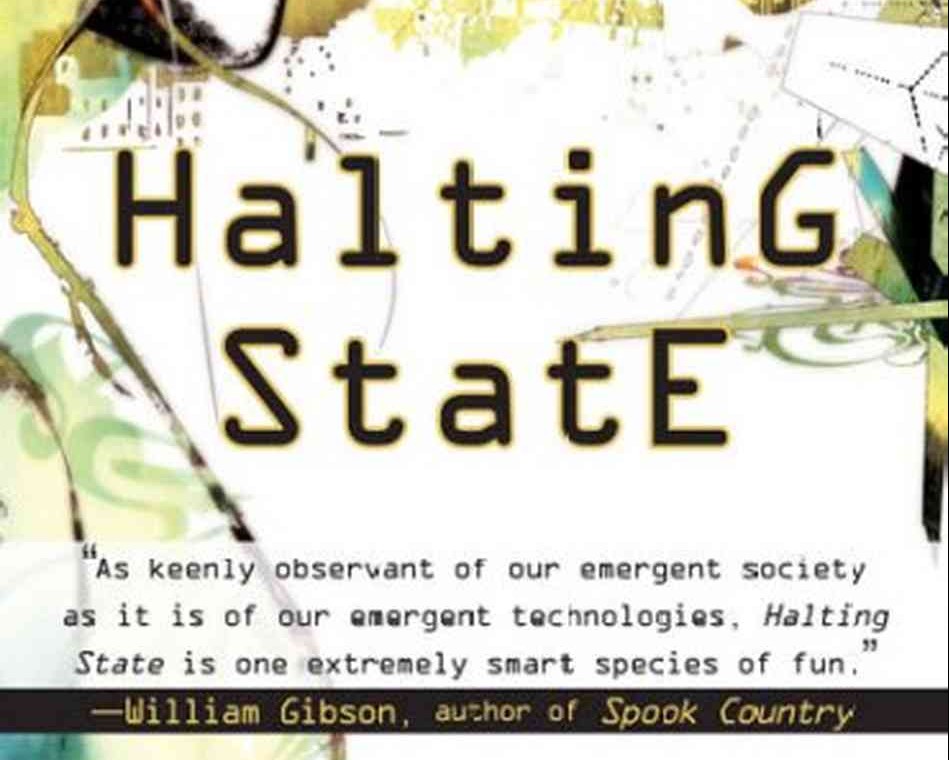A multi-viewpoint novel that manages to weave several threads at once to make a story, Halting State takes us into a future where information, interaction and games have to a large extent blended with the real world through the near ubiquitous use of augmented reality overlays.
I had a very hard time deciding if I liked this book or not.
On the one hand, the vision of the future is extremely well-pitched, with augmented reality providing different layers of information overlaid onto the real world through the use of glasses that are more or less ubiquitous. The police see the Copspace overlay, army see Milspace, and the technology has allowed gaming to step out of the realm of 100% simulation and into the real world. At the same time, massively multiplayer online gaming has reached a stage where so much value is at stake that specialised financial companies are contracted to manage the in-game economies by taking control of the central bank. The games run on compatible platforms, which results in borders and passages from one game to another, and games compete for players through the aggressive management of “fun”.
These technologies, valuable though they are, provide numerous new ways to compromise national security and corporate secrecy, and this is not lost on the various secret services and terrorist groups, who have all been creative in their use of the virtual and semi-virtual environments.
What we then have is a detective story that begins with the robbery of the central bank of a major online game. This is the thread that our main characters pull on, which begins to unravel a much larger series of interlocking conspiracies that rapidly spill over into the real world.
Despite the very promising melange, somewhat reminiscent of Neal Stephenson (the master of this particular art), we have a narrative that doesn’t quite know what it wants to do, and therefore tries to do too much.
A short way into the book I began wondering why I was being beaten over the head with a narrative written in the second person. That is a very strange point of view to adopt, and a very unusual literary device. Had there been a specific point to adopting it I might have found it interesting, but instead it was just jarring, and combined with the rapid jumps between three different main characters – each with their own point of view – made the book heavy going. I had such a hard time getting used to the narrative style that I put the book down, re-read Snow Crash to remember how this kind of world can be properly portrayed, and then came back to it.
The narrative also doesn’t entirely decide whether it wants to be a bit funny or more serious. The technology and its implications are very interesting and have the potential for much storytelling and analysis, but while we’re reading about the very real theft of tens of thousands of dollars worth of merchandise in a virtual environment, we get descriptions of orcs and dragons that appear to serve no purpose, all narrated by a confused Scottish police officer which means we’re in for lots of “Aye, Reet” and “Ye dinna have tae take ma wurd fer it, I’ll text you a photie“, in order to get the point across that her accent is unintelligible.
I’ve lived in Scotland, briefly, so it doesn’t bother me too much, it’s even charming in small doses, but I can’t imagine it going down easily for a US audience, for example.
I feel like there’s a lot of potential here, but I keep thinking of Stephenson and the way he gets so much more into the story than just a detective story – the interesting world-building is just that, it doesn’t go further, making any points about how this world affects people, how it might affect the balance of power between government and people, rich and poor, first world and third world, or whatever. It doesn’t go into much depth about the relative importance to people of the online world versus the offline world, and how people’s habits might change, and what felt like a world quickly becomes window-dressing for a detective story.
Given the potential of the vision, I’ve already bought the next book in the series and it’s on my virtual “to-read” shelf, and I’m hoping Charles Stross is more ambitious next time. I think this could lead to something great.
In short, I enjoyed the book, but was left with the feeling that I’d been sold a full meal and realised at the end of it that I’d been put on a diet without getting told first.



